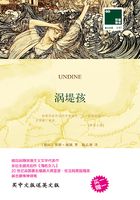"This," said he, "cannot hold; but a change, a total change of sentiments— No, no, do not desire it—for when the romantic refinements of a young mind are obliged to give way, how frequently are they succeeded by such opinions as are but too common, and too dangerous! I speak from experience. I once knew a lady who in temper and mind greatly resembled your sister, who thought and judged like her, but who from an enforced change —from a series of unfortunate circumstances—" Here he stopped suddenly; appeared to think that he had said too much, and by his countenance gave rise to conjectures which might not otherwise have entered Elinor's head. The lady would probably have passed without suspicion, had he not convinced Miss Dashwood that what concerned her ought not to escape his lips. As it was, it required but a slight effort of fancy to connect his emotion with the tender recollection of past regard. Elinor attempted no more. But Marianne, in her place, would not have done so little. The whole story would have been speedily formed under her active imagination; and everything established in the most melancholy order of disastrous love.
Chapter 12
AS ELINOR AND Marianne were walking together the next morning the latter communicated a piece of news to her sister, which in spite of all that she knew before of Marianne's imprudence and want of thought, surprised her by its extravagant testimony of both. Marianne told her, with the greatest delight, that Willoughby had given her a horse, one that he had bred himself on his estate in Somersetshire, and which was exactly calculated to carry a woman. Without considering that it was not in her mother's plan to keep any horse, that if she were to alter her resolution in favour of this gift, she must buy another for the servant, and keep a servant to ride it, and after all, build a stable to receive them, she had accepted the present without hesitation, and told her sister of it in raptures.
"He intends to send his groom into Somersetshire immediately for it," she added, "and when it arrives we will ride everyday. You shall share its use with me. Imagine to yourself, my dear Elinor, the delight of a gallop on some of these downs."
Most unwilling was she to awaken from such a dream of felicity, to comprehend all the unhappy truths which attended the affair; and for some time she refused to submit to them. As to an additional servant, the expense would be a trifle; mama she was sure would never object to it;and any horse would do for him;he might always get one at the park;as to a stable, the merest shed would be sufficient. Elinor then ventured to doubt the propriety of her receiving such a present from a man so little,or at least so lately known to her. This was too much.
"You are mistaken, Elinor," said she warmly, "in supposing I know very little of Willoughby. I have not known him long indeed, but I am much better acquainted with him than I am with any other creature in the world, except yourself and mama. It is not time or opportunity that is to determine intimacy; it is disposition alone. Seven years would be insufficient to make some people acquainted with each other, and seven days are more than enough for others. I should hold myself guilty of greater impropriety in accepting a horse from my brother than from Willoughby. Of John I know very little, though we have lived together for years; but of Willoughby my judgment has long been formed."
Elinor thought it wisest to touch that point no more. She knew her sister's temper. Opposition on so tender a subject would only attach her the more to her own opinion. But by an appeal to her affection for her mother, by representing the inconveniences which that indulgent mother must draw on herself if (as would probably be the case) she consented to this increase of establishment, Marianne was shortly subdued; and she promised not to tempt her mother to such imprudent kindness by mentioning the offer, and to tell Willoughby when she saw him next that it must be declined.
She was faithful to her word; and when Willoughby called at the cottage, the same day, Elinor heard her express her disappointment to him in a low voice, on being obliged to forego the acceptance of his present. The reasons for this alteration were at the same time related, and they were such as to make further entreaty on his side impossible. His concern however was very apparent; and after expressing it with earnestness, he added in the same low voice, "But, Marianne, the horse is still yours, though you cannot use it now. I shall keep it only till you can claim it. When you leave Barton to form your own establishment in a more lasting home, Queen Mab shall receive you."
This was all overheard by Miss Dashwood; and in the whole of the sentence, in his manner of pronouncing it, and in his addressing her sister by her Christian name alone, she instantly saw an intimacy so decided, a meaning so direct, as marked a perfect agreement between them. From that moment she doubted not of their being engaged to each other; and the belief of it created no other surprise than that she, or any of their friends, should be left by tempers so frank to discover it by accident.
Margaret related something to her the next day which placed this matter in a still clearer light. Willoughby had spent the preceding evening with them, and Margaret, by being left some time in the parlour with only him and Marianne, had had opportunity for observations, which, with a most important face, she communicated to her elder sister when they were next by themselves.
"Oh! Elinor," she cried, "I have such a secret to tell you about Marianne. I am sure she will be married to Mr. Willoughby very soon."
"You have said so," replied Elinor, "almost everyday since they first met on High-church Down; and they had not known each other a week, I believe, before you were certain that Marianne wore his picture round her neck; but it turned out to be only the miniature of our great uncle."
"But indeed this is quite another thing. I am sure they will be married very soon, for he has got a lock of her hair."
"Take care,Margaret.It may be only the hair of some great uncle of his."
"But indeed, Elinor, it is Marianne's. I am almost sure it is, for I saw him cut it off. Last night after tea, when you and mamma went out of the room, they were whispering and talking together as fast as could be, and he seemed to be begging something of her, and presently he took up her scissors and cut off a long lock of her hair, for it was all tumbled down her back; and he kissed it, and folded it up in a piece of white paper, and put it into his pocketbook."
From such particulars stated on such authority, Elinor could not withhold her credit: nor was she disposed to it, for the circumstance was in perfect unison with what she had heard and seen herself.
Margaret's sagacity was not always displayed in a way so satisfactory to her sister. When Mrs. Jennings attacked her one evening at the park, to give the name of the young man who was Elinor's particular favourite, which had been long a matter of great curiosity to her, Margaret answered by looking at her sister and saying, "I must not tell, may I, Elinor?"
This of course made everybody laugh; and Elinor tried to laugh too. But the effort was painful. She was convinced that Margaret had fixed on a person whose name she could not bear with composure to become a standing joke with Mrs. Jennings.
Marianne felt for her most sincerely; but she did more harm than good to the cause by turning very red and saying in an angry manner to Margaret:
"Remember that whatever your conjectures may be, you have no right to repeat them."
"I never had any conjectures about it," replied Margaret; "it was you who told me of it yourself."
This increased the mirth of the company, and Margaret was eagerly pressed to say something more.
"Oh! pray, Miss Margaret, let us know all about it," said Mrs. Jennings. "What is the gentleman's name?"
"I must not tell, ma'am. But I know very well what it is; and I know where he is too."
"Yes, yes, we can guess where he is; at his own house at Norland to be sure. He is the curate of the parish I dare say."
"No,that he is not.He is of no profession at all."
"Margaret," said Marianne with great warmth, "you know that all this is an invention of your own and that there is no such person in existence."
"Well then he is lately dead, Marianne, for I am sure there was such a man once, and his name begins with an F."
Most grateful did Elinor feel to Lady Middleton for observing at this moment "that it rained very hard", though she believed the interruption to proceed less from any attention to her than from her ladyship's great dislike of all such inelegant subjects of raillery as delighted her husband and mother. The idea, however, started by her, was immediately pursued by Colonel Brandon, who was on every occasion mindful of the feelings of others; and much was said on the subject of rain by both of them. Willoughby opened the pianoforte, and asked Marianne to sit down to it; and thus amidst the various endeavours of different people to quit the topic, it fell to the ground. But not so easily did Elinor recover from the alarm into which it had thrown her.
A party was formed this evening for going on the following day to see a very fine place about twelve miles from Barton, belonging to a brother-in-law of Colonel Brandon, without whose interest it could not be seen, as the proprietor, who was then abroad, had left strict orders on that head. The grounds were declared to be highly beautiful, and Sir John, who was particularly warm in their praise, might be allowed to be a tolerable judge, for he had formed parties to visit them at least twice every summer for the last ten years. They contained a noble piece of water, a sail on which was to form a great part of the morning's amusement; cold provisions were to be taken, open carriages only to be employed, and everything conducted in the usual style of a complete party of pleasure.
To some few of the company it appeared rather a bold undertaking, considering the time of year and that it had rained every day for the last fortnight; and Mrs. Dashwood, who had already a cold, was persuaded by Elinor to stay at home.
Chapter 13
THEIR INTENDED EXCURSION to Whitwell turned out very differently from what Elinor had expected. She was prepared to be wet through, fatigued, and frightened; but the event was still more unfortunate, for they did not go at all.
By ten o'clock the whole party were assembled at the park, where they were to breakfast. The morning was rather favourable, though it had rained all night, as the clouds were then dispersing across the sky, and the sun frequently appeared. They were all in high spirits and good humour, eager to be happy, and determined to submit to the greatest inconveniences and hardships rather than be otherwise.
While they were at breakfast the letters were brought in. Among the rest there was one for Colonel Brandon. He took it, looked at the direction, changed colour, and immediately left the room.
"What is the matter with Brandon?" said Sir John.
Nobody could tell.
"I hope he has had no bad news," said Lady Middleton. "It must be something extraordinary that could make Colonel Brandon leave my breakfast table so suddenly."
In about five minutes he returned.
"No bad news, Colonel, I hope," said Mrs. Jennings as soon as he entered the room.
"None at all, ma'am, I thank you."
"Was it from Avignon? I hope it is not to say that your sister is worse."
"No, ma'am. It came from town and is merely a letter of business."
"But how came the hand to discompose you so much if it was only a letter of business? Come, come, this won't do, Colonel; so let us hear the truth of it."
"My dear Madam," said Lady Middleton, "recollect what you are saying."
"Perhaps it is to tell you that your cousin Fanny is married?" said Mrs. Jennings, without attending to her daughter's reproof.
"No, indeed, it is not."
"Well, then, I know who it is from, Colonel. And I hope she is well."
"Whom do you mean, ma'am?" said he, colouring a little.
"Oh! you know who I mean."
"I am particularly sorry, ma'am," said he, addressing Lady Middleton, "that I should receive this letter today, for it is on business which requires my immediate attendance in town."
"In town!" cried Mrs. Jennings. "what can you have to do in town at this time of year?"
"My own loss is great," he continued, "in being obliged to leave so agreeable a party; but I am the more concerned, as I fear my presence is necessary to gain your admittance at Whitwell."
What a blow upon them all was this!
"But if you write a note to the housekeeper, Mr. Brandon," said Marianne eagerly, "will it not be sufficient?"
He shook his head.
"We must go,"said Sir John."It shall not be put off when we are so near it. You cannot go to town till to-morrow, Brandon, that is all."
"I wish it could be so easily settled. But it is not in my power to delay my journey for one day!"
"If you would but let us know what your business is," said Mrs. Jennings,"we might see whether it could be put off or not."
"You would not be six hours later," said Willoughby, "if you were to defer your journey till our return."
"I cannot afford to lose one hour."
Elinor then heard Willoughby say in a low voice to Marianne, "There are some people who cannot bear a party of pleasure. Brandon is one of them. He was afraid of catching cold, I dare say, and invented this trick for getting out of it. I would lay fifty guineas the letter was of his own writing."
"I have no doubt of it," replied Marianne.
"There is no persuading you to change your mind, Brandon, I know of old," said Sir John, "when once you are determined on anything. But, however, I hope you will think better of it. Consider, here are the two Miss Careys come over from Newton, the three Miss Dashwoods walked up from the cottage, and Mr. Willoughby got up two hours before his usual time, on purpose to go to Whitwell."
Colonel Brandon again repeated his sorrow at being the cause of disappointing the party, but at the same time declared it to be unavoidable.
"Well then, when will you come back again?"
"I hope we shall see you at Barton," added her ladyship, "as soon as you can conveniently leave town; and we must put off the party to Whitwell till you return."
"You are very obliging. But it is so uncertain when I may have it in my power to return that I dare not engage for it at all."
"Oh! he must and shall come back," cried Sir John. "If he is not here by the end of the week, I shall go after him."
"Aye, so do, Sir John," cried Mrs. Jennings, "and then perhaps you may find out what his business is."
"I do not want to pry into other men's concerns. I suppose it is something he is ashamed of."
Colonel Brandon's horses were announced.
"You do not go to town on horseback, do you?" added Sir John.
"No. Only to Honiton. I shall then go post."
"Well, as you are resolved to go, I wish you a good journey. But you had better change your mind."
"I assure you it is not in my power."
He then took leave of the whole party.
"Is there no chance of my seeing you and your sisters in town this winter, Miss Dashwood?"
"I am afraid none at all."
"Then I must bid you farewell for a longer time than I should wish to do."
To Marianne he merely bowed and said nothing.
"Come, Colonel," said Mrs. Jennings, "before you go, do let us know what you are going about."
He wished her a good morning, and attended by Sir John, left the room.
The complaints and lamentations which politeness had hitherto restrained now burst forth universally, and they all agreed again and again how provoking it was to be so disappointed.
"I can guess what his business is, however," said Mrs. Jennings exultingly.
"Can you, ma'am?" said almost everybody.
"Yes, it is about Miss Williams, I am sure."
"And who is Miss Williams?" asked Marianne.
"What! Do not you know who Miss Williams is? I am sure you must have heard of her before. She is a relation of the Colonel's, my dear; a very near relation. We will not say how near, for fear of shocking the young ladies." Then lowering her voice a little, she said to Elinor, "She is his natural daughter."
"Indeed!"
"Oh! yes, and as like him as she can stare. I dare say the Colonel will leave her all his fortune."
When Sir John returned, he joined most heartily in the general regret on so unfortunate an event; concluding however by observing, that as they were all got together, they must do something by way of being happy; and after some consultation it was agreed, that although happiness could only be enjoyed at Whitwell, they might procure a tolerable composure of mind by driving about the country. The carriages were then ordered. Willoughby's was first, and Marianne never looked happier than when she got into it. He drove through the park very fast, and they were soon out of sight; and nothing more of them was seen till their return, which did not happen till after the return of all the rest. They both seemed delighted with their drive, but said only in general terms that they had kept in the lanes while the others went on the downs.
It was settled that there should be a dance in the evening and that everybody should be extremely merry all day long. Some more of the Careys came to dinner, and they had the pleasure of sitting down nearly twenty to table, which Sir John observed with great contentment. Willoughby took his usual place between the two elder Miss Dashwoods. Mrs. Jennings sat on Elinor's right hand; and they had not been long seated, before she leaned behind her and Willoughby, and said to Marianne loud enough for them both to hear, "I have found you out in spite of all your tricks. I know where you spent the morning."
Marianne coloured, and replied very hastily, "Where, pray?"
"Did not you know," said Willoughby, "that we had been out in my curricle?"
"Yes, yes, Mr. Impudence, I know that very well, and I was determined to find out where you had been to.—I hope you like your house, Miss Marianne. It is a very large one I know, and when I come to see you, I hope you will have new-furnished it, for it wanted it very much when I was there six years ago."
Marianne turned away in great confusion. Mrs. Jennings laughed heartily; and Elinor found that in her resolution to know where they had been, she had actually made her own woman inquire of Mr. Willoughby's groom, and that she had by that method been informed that they had gone to Allenham and spent a considerable time there in walking about the garden and going all over the house.
Elinor could hardly believe this to be true, as it seemed very unlikely that Willoughby should propose or Marianne consent to enter the house while Mrs. Smith was in it, with whom Marianne had not the smallest acquaintance.
As soon as they left the dining-room, Elinor inquired of her about it; and great was her surprise when she found that every circumstance related by Mrs. Jennings was perfectly true. Marianne was quite angry with her for doubting it.
"Why should you imagine, Elinor, that we did not go there, or that we did not see the house? Is not it what you have often wished to do yourself?"
"Yes, Marianne, but I would not go while Mrs. Smith was there, and with no other companion than Mr. Willoughby."
"Mr. Willoughby however is the only person who can have a right to show that house; and as we went in an open carriage, it was impossible to have any other companion. I never spent a pleasanter morning in my life."
"I am afraid," replied Elinor, "that the pleasantness of an employment does not always evince its propriety."
"On the contrary, nothing can be a stronger proof of it, Elinor; for if there had been any real impropriety in what I did, I should have been sensible of it at the time, for we always know when we are acting wrong, and with such a conviction I could have had no pleasure."
"But, my dear Marianne, as it has already exposed you to some very impertinent remarks, do you not now begin to doubt the discretion of your own conduct?"
"If the impertinent remarks of Mrs. Jennings are to be the proof of impropriety in conduct, we are all offending every moment of all our lives. I value not her censure any more than I should do her commendation. I am not sensible of having done anything wrong in walking over Mrs. Smith's grounds, or in seeing her house. They will one day be Mr. Willoughby's, and—"
"If they were one day to be your own, Marianne, you would not be justified in what you have done."
She blushed at this hint; but it was even visibly gratifying to her; and after a ten minutes’ interval of earnest thought, she came to her sister again and said with great good humour,"Perhaps,Elinor,it was rather ill-judged in me to go to Allenham; but Mr. Willoughby wanted particularly to show me the place; and it is a charming house I assure you. There is one remarkably pretty sitting-room upstairs of a nice comfortable size for constant use, and with modern furniture it would be delightful. It is a corner room, and has windows on two sides. On one side you look across the bowling-green, behind the house, to a beautiful hanging wood, and on the other you have a view of the church and village, and beyond them, of those fine bold hills that we have so often admired. I did not see it to advantage, for nothing could be more forlorn than the furniture, but if it were newly fitted up—a couple of hundred pounds, Willoughby says, would make it one of the pleasantest summer-rooms in England."
Could Elinor have listened to her without interruption from the others, she would have described every room in the house with equal delight.
Chapter 14
THE SUDDEN TERMINATION of Colonel Brandon's visit at the park, with his steadiness in concealing its cause, filled the mind and raised the wonder of Mrs. Jennings for two or three days; she was a great wonderer, as everyone must be who takes a very lively interest in all the comings and goings of all their acquaintance. She wondered with little intermission what could be the reason of it; was sure there must be some bad news, and thought over every kind of distress that could have befallen him, with a fixed determination that he should not escape them all.















